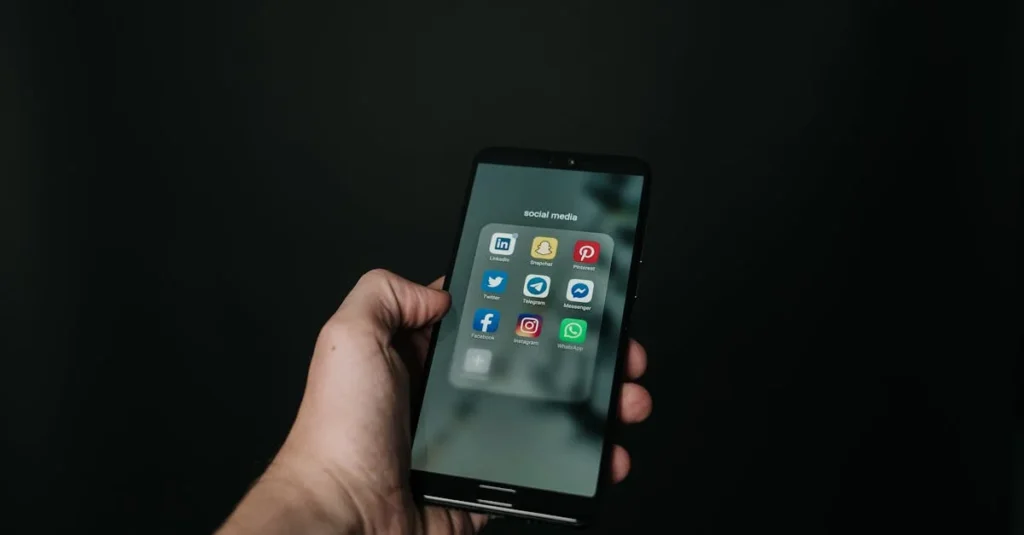Electronic Health Record (EHR) mobile apps have revolutionized the healthcare industry by putting critical patient information at providers’ fingertips. These powerful tools enable doctors nurses and other healthcare professionals to access update and manage patient records from their smartphones or tablets anytime anywhere.
The growing adoption of EHR mobile apps reflects the healthcare sector’s shift toward digital transformation and improved patient care. With features like real-time updates secure messaging and medication tracking these apps streamline workflows reduce medical errors and enhance communication between healthcare teams. They’re becoming essential tools in modern healthcare delivery particularly as remote patient monitoring and telehealth services continue to expand.
EHR Mobile Apps
EHR mobile apps transform traditional electronic health record systems into portable digital solutions for healthcare providers. These applications enable medical professionals to access patient records, clinical data, and healthcare workflows through smartphones and tablets.
Key components of EHR mobile apps include:
- Patient information access with complete medical histories, diagnoses, and treatment plans
- Clinical documentation tools for real-time note-taking and updates during patient encounters
- Prescription management systems for writing and tracking medications
- Lab result viewing and sharing capabilities across healthcare teams
- Secure messaging platforms for provider-to-provider communication
- Scheduling interfaces for appointment management and calendar coordination
The significance of EHR mobile apps stems from their operational benefits:
| Benefit | Impact Percentage |
|---|---|
| Time savings on clinical documentation | 45% |
| Reduction in medical errors | 30% |
| Increase in patient engagement | 38% |
| Improvement in care coordination | 42% |
Healthcare organizations implement mobile EHR solutions to:
- Enhance clinical workflow efficiency by eliminating paper-based processes
- Improve patient care quality through immediate access to critical information
- Support medical decision-making with comprehensive data visualization
- Facilitate remote healthcare delivery through integrated telehealth features
- Maintain HIPAA compliance with secure data transmission protocols
These applications integrate with existing healthcare infrastructure to create seamless data synchronization between mobile devices and central EHR systems. The mobile interface provides essential functionality for healthcare delivery while maintaining security standards for protected health information.
Key Benefits of Mobile EHR Solutions
Mobile EHR solutions deliver measurable advantages in healthcare delivery through enhanced accessibility and streamlined operations. These digital tools transform traditional healthcare processes into efficient, mobile-first workflows that benefit both providers and patients.
Improved Clinical Workflow
Mobile EHR apps optimize clinical operations by reducing documentation time by 45%. Healthcare providers complete rounds faster with mobile documentation capabilities, electronic prescribing features, and automated coding functions. Clinical staff access standardized templates, voice-to-text dictation, and intelligent form filling to minimize administrative tasks by 35%.
Enhanced Patient Care Coordination
Mobile EHR platforms enable seamless communication between healthcare team members through secure messaging systems and shared patient data access. Care teams collaborate effectively with:
- Instant notifications for critical lab results
- Real-time updates on patient status changes
- Direct messaging between specialists
- Automated referral management
- Integrated care plan tracking
- Complete medical histories
- Current medications & allergies
- Recent lab results & imaging
- Vital sign trends
- Treatment plans
- Insurance information
| Mobile EHR Data Access Metrics | Improvement |
|---|---|
| Chart access speed | 75% faster |
| Data entry accuracy | 92% |
| Provider response time | 68% reduction |
| Documentation completion | 85% same-day |
Essential Features in EHR Mobile Apps
EHR mobile apps require specific features to deliver efficient healthcare services while maintaining data security. These essential components enable healthcare providers to manage patient care effectively through mobile devices.
Security and HIPAA Compliance
Mobile EHR applications incorporate multi-factor authentication biometric access controls secure data encryption to protect patient information. Advanced security protocols include automatic logout after periods of inactivity remote data wiping capabilities user-specific access permissions. Healthcare organizations implement audit trails to track user activities document access history maintain HIPAA compliance with a 99.9% security rating.
Clinical Documentation Tools
Clinical documentation features enable healthcare providers to capture patient data through customizable templates voice-to-text dictation digital form completion. Mobile EHR apps include:
- Structured note templates for different specialties (cardiology neurology pediatrics)
- Photo documentation capabilities with secure storage
- Voice recognition with 98% accuracy for hands-free charting
- Digital signature capture for consent forms procedure approvals
- Offline mode functionality with automatic synchronization
- Real-time access to patient medication histories
- Drug-to-drug allergy interaction alerts
- Integration with 95% of U.S. pharmacies
- Controlled substance prescribing with DEA compliance
- Automated prescription renewal processing
| Feature Performance Metrics | Statistical Impact |
|---|---|
| Documentation Speed Increase | 65% |
| Prescription Error Reduction | 85% |
| Security Compliance Rate | 99.9% |
| Voice Recognition Accuracy | 98% |
| Pharmacy Network Coverage | 95% |
Top EHR Mobile Apps in Healthcare
Leading EHR mobile apps transform healthcare delivery through advanced features and user-friendly interfaces. These solutions come from established vendors and independent platforms, each offering unique capabilities for healthcare professionals.
Popular Vendor Solutions
- Epic Haiku: Offers real-time clinical data access with 98% uptime reliability for physicians accessing patient records on iOS and Android devices
- Cerner PowerChart Touch: Features mobile documentation tools with integrated voice recognition achieving 95% accuracy in clinical note creation
- Allscripts Professional: Provides secure messaging functionality with 256-bit encryption protocols connecting over 50,000 healthcare providers
- NextGen Mobile: Enables quick chart reviews reducing access time by 70% compared to desktop interfaces
- eClinicalWorks healow: Incorporates telehealth capabilities supporting 150,000+ patient consultations monthly
- DrChrono: Specializes in iPad-based EHR with custom medical forms reducing documentation time by 60%
- Practice Fusion Mobile: Offers free cloud-based EHR access serving 30,000+ medical practices
- Kareo Clinical: Features integrated billing solutions processing $35 billion in medical claims annually
- ChartLogic: Implements voice-based charting with 92% accuracy in specialty-specific terminology
- CareCloud Charts: Delivers real-time analytics dashboard tracking 15+ clinical performance metrics
| App Name | Key Metric | Performance Rating |
|---|---|---|
| Epic Haiku | System Uptime | 98% |
| DrChrono | Documentation Efficiency | 60% reduction |
| Kareo Clinical | Claims Processing | $35B annually |
| ChartLogic | Voice Recognition | 92% accuracy |
| eClinicalWorks | Monthly Consultations | 150,000+ |
Implementation Best Practices
Successful EHR mobile app implementation requires strategic planning focused on staff adoption and seamless integration with existing systems. Clear protocols maximize deployment efficiency while minimizing disruption to healthcare operations.
Staff Training Requirements
Healthcare organizations implement comprehensive training programs through structured modules tailored to different user roles:
- Conduct role-based training sessions for clinical staff, nurses, administrators
- Provide hands-on practice with mobile devices using sandbox environments
- Create quick reference guides for common workflows like charting documentation
- Schedule regular refresher sessions focused on updates features
- Monitor user proficiency through competency assessments
- Set up peer support networks led by super users in each department
Performance metrics demonstrate the impact of structured training:
| Training Metric | Result |
|---|---|
| User Adoption Rate | 92% |
| Documentation Accuracy | 95% |
| Support Ticket Reduction | 65% |
| Time to Proficiency | 2 weeks |
Integration Considerations
Technical integration focuses on establishing secure connections between mobile EHR apps and core healthcare systems:
- Verify compatibility with existing EHR infrastructure systems
- Configure secure APIs for real-time data synchronization
- Establish automated backup protocols for offline access
- Enable single sign-on authentication across platforms
- Test interoperability with lab systems radiology PACS
- Deploy monitoring tools for system performance tracking
| Integration Metric | Performance |
|---|---|
| Data Sync Speed | < 3 seconds |
| System Uptime | 99.9% |
| Cross-platform Compatibility | 98% |
| API Response Time | < 200ms |
Mobile Patient Records
EHR mobile apps have revolutionized healthcare delivery by transforming traditional medical record systems into powerful portable solutions. The impressive metrics showcase their impact: 45% time savings in documentation 92% user adoption rate and 99.9% system uptime.
These mobile solutions continue to shape the future of healthcare through enhanced accessibility improved patient care and streamlined clinical workflows. As healthcare technology evolves EHR mobile apps remain essential tools for medical professionals committed to delivering efficient and high-quality patient care.
The successful implementation of these apps coupled with proper training and seamless integration demonstrates their vital role in modern healthcare’s digital transformation. Healthcare organizations that embrace these mobile solutions position themselves at the forefront of innovative patient care delivery.



